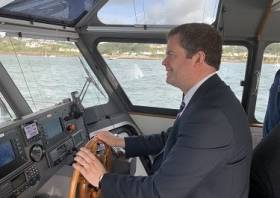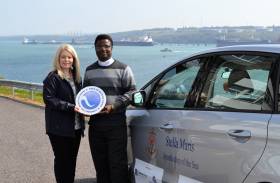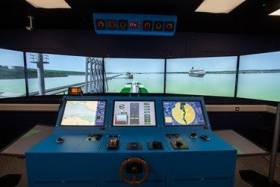Displaying items by tag: Port of Milford Haven,Wales
Politicians Visit Dublin Port & UK's Largest Energy Port Against Backdrop of Brexit Preparedness
In advance of the UK's prime minister Boris Johnston meeting today in Dublin, it was also reported on RTE News of yesterday's visit by Leo Varakar to Dublin Port where the Taoiseach viewed the €30 million investment that has been put in place to prepare for a possible no-deal Brexit.
While on the other side of the Irish Sea politicians recently paid a visit to the Welsh Port of Milford Haven to view operations at the UK’s largest energy Port.
According to the Milford Haven Port Authority, the Parliamentary Under-Secretary of State for Wales Kevin Foster MP was joined by Stephen Crabb MP and Paul Davies AM for a tour of the Pembrokeshire port located in south-west Wales.
The party were taken on a tour of the Waterway onboard a pilot vessel, hosted by the Port’s Chief Executive Andy Jones, Chairman Chris Martin and Harbourmaster Mike Ryan, where they were able to discuss the Port’s vital role as an important hub of regionally and nationally significant economic activity and employment. Naturally this included topics such as Brexit preparedness and the potential opportunity, post-Brexit, for the Port of Milford Haven to be designated as a Freeport.
As supporters of Pembroke Dock Marine which aims to anchor wave, tidal and floating wind renewable energy developers in Pembrokeshire, the Minister, Stephen and Paul were also keen to hear how that project was progressing as part of the Swansea Bay City Deal.
Andy Jones, Chief Executive at the Port of Milford Haven, discussed the potential impact that 0% import tariffs on petrol will have on UK refineries with the Minister. “Not only is Valero a national asset,” said Andy, “in Pembrokeshire it plays a critical role in supporting an otherwise rural economy and is one of Pembrokeshire’s largest employers. Post Brexit, providing the necessary conditions for continued business investment of businesses like Valero in the face of global competition will be essential in order to secure the viability of the energy cluster here”.
“We welcomed the opportunity to share our thoughts on the idea of Milford Haven being designated as a Freeport and expanded on that idea to develop the concept of a Port Zone” continued Andy. “Port Zones would include accelerated regulatory processes. Prioritising Port Zones would also help reduce investment risk and uncertainty and make the Port a more attractive proposition for potential global investors.”
“The UK Government has a vision for Freeports to boost investment, drive innovation, attract high skill jobs, support free enterprise and drive growth in left-behind areas across the UK,” continued Andy “and while Freeports tend to be associated with general purpose manufacturing and logistics, the Port of Milford Haven’s internationally significant energy sector offers a unique opportunity.”
“As the UK’s leading energy port with its cluster of anchor businesses, excellent grid connectivity and world-class supply chain, the Port of Milford Haven would have a strong competitive advantage attracting relevant investment opportunities were it to be a Freeport. A Freeport designation, aligned with the Haven Waterway Enterprise Zone, would seek to support UK oil and gas refining and processing capacity as it competes for global foreign direct investment, restore fish processing capability and support tidal and wave energy development to name a few of the potential opportunities.”
UK Government Minister for Wales Kevin Foster said: “It is fantastic to see the Port of Milford Haven developing plans for a world class centre for marine energy, attracting inward investment and creating more highly skilled jobs. I look forward to working closely with the Port and Welsh Government to develop this project as part of the Swansea Bay City Deal, generating transformational growth across the region.”
#ports&shipping - The south Wales Port of Milford Haven is continuing its support for the Apostleship of the Sea this year with financial backing to help the organisation provide support for seafarers visiting Pembrokeshire.
The Apostleship of the Sea provides practical and pastoral care to all seafarers, regardless of nationality, belief or race. The Port Chaplains and Volunteer Ship Visitors welcome seafarers and offer welfare services and advice, as well as practical help, care and friendship. It is part of an international network known to the maritime world as Stella Maris, and works in more than 300 ports around the world.
In 2018, the Port Chaplains and Volunteers at the Apostleship of the Sea carried out 697 ship visits within the Port of Milford Haven, reaching around 15,000 seafarers. They also provided transport for crews of 359 vessels from their jetty to town and the main port offices.
Father Paul Osunyikanmi, Apostleship of the Sea Chaplain for the Port of Milford Haven and Pembroke Port, commented: “The Port of Milford Haven’s support over the years has helped us deliver a reliable service to visiting seafarers. Seafarers can sometimes be over looked and undervalued so their welfare, especially whilst away from home for so long, is very important. We are grateful that the Port recognises this importance, and is supportive of our efforts.”
Anna Malloy, Stakeholder Engagement and Communications Manager at the Port of Milford Haven, added: “Wellbeing is an important element of safety, and safety is at the heart of everything we do at the Port. That is why we value the work of the Apostleship of the Sea and other organisations seeking to enhance seafarers’ welfare. As the UK’s largest energy port, we welcome seafarers from all over the globe who travel on some of the world’s largest ships to bring in vital energy supplies. Many of these men and women have limited access to communication and transport once off the ship. The Apostleship of the Sea offers a comprehensive service that deploys Port Chaplains and Ship Visitors to focus on the needs that are greatest for seafarers visiting the Port.”
Welsh Port Offers Tug Safety Training Courses Using State-of-the-Art Simulation Suite
#Ports&Shipping - The Welsh port of Milford Haven in south Wales, is offering tug safety training courses that uses a powerful virtual-reality ship simulation system, which will assist tug boat operators from across Britain.
The Navigation Suite, based at Milford Waterfront, creates highly realistic computer-generated versions of any port in the world, giving trainees the opportunity to take the controls of any vessel, including tugboats, to practice scenarios.
Tug skippers from Williams Marine Services and Teignmouth Harbour Commission spent two days undertaking theory based safety training and working on simulated ‘as real’ scenarios within the port. Training focused on the dangers around small conventional tug handling, the importance of good communication between pilots and tug handlers, and working in poor weather conditions.
Harbourmaster and Chief Executive Officer at Teignmouth Harbour Commission, Commander David Vaughan, put some of his team through the course, “Our employees returned from the course with nothing but praise for an excellent, well run and well-presented course. There has been a gap in the market for this kind of training for small port tug operators which has now been filled.”
Steve Hardcastle, Deputy Harbourmaster at the Port of Milford Haven, manages the simulation suite. “This facility enables maritime professionals to get bespoke training in a safe environment,” said Steve. “The cutting-edge technology means that any type of incident can be replicated in any location. The suite is operated by marine professionals and pilots and who have experienced the scenarios that are presented during the exercises, so they are well placed to oversee the training. This course is overseen by David Brown of DB Marine, a very experienced tug professional.”
Built using MARIN’s latest software, DOLPHIN, the navigation suite can introduce additional environmental and hydrodynamic forces, and gives Tug Masters or Boat Masters the opportunity to carry out the towage of single or multiple barge movements either pulling, pushing or ‘hipped up’ depending on the size of the barge or pontoon.
They work in simulated form on small and some larger ships understanding and realising the dangers of connecting up, girting and under the bow towage.
































































